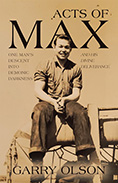
 |
Acts of Max: One Man’s Descent Into Demonic Darkness and His Divine Deliverance
by Garry Olson
WestBow Press
Olson has constructed a biography of his father, Max—a dynamic figure whose love for his son and other family members was expressed in unusual ways. The author and his twin brother were very young when his parents separated and would become visitors and boarders with Max and his new wife. This uncomfortable situation was ameliorated when the two were allowed to accompany Max on his fishing expeditions, using equipment including spear guns and learning to scuba dive. Max was “a dutiful father, if not an affectionate one,” exacting strict punishments when his sons disobeyed him and only once, drunkenly, announcing his love for the boys.
However, in early adulthood, Olson viewed Max in a new light, as his father willingly shared his wealth directly, depicted by the author as the one way his parent showed his love and respect. In older age, sadly, Max’s personality disintegrated. He lost his memory, committed crimes, and waxed paranoid about imagined enemies, while the medications prescribed for him rarely brought improvement. Caring for him, as his children steeled themselves to do, was deeply distressing until a Christian conversion led to a remarkable transformation of this man whose condition had previously seemed incurable.
Olson’s close kinship with siblings and his children and his personal zeal to help and, if possible, heal Max are melded here with the saga of a vigorous, self-activating man whose capabilities were many but did not include emotional articulation. In composing this paean to Max, Olson reveals both his talents as a wordsmith and the development of his religious conviction that would play a vital role for Max in the waning days of his earthly existence. Those who face similar familial challenges will welcome Olson’s open, honest account, which would make a fine focus for Christian discussion and outreach.